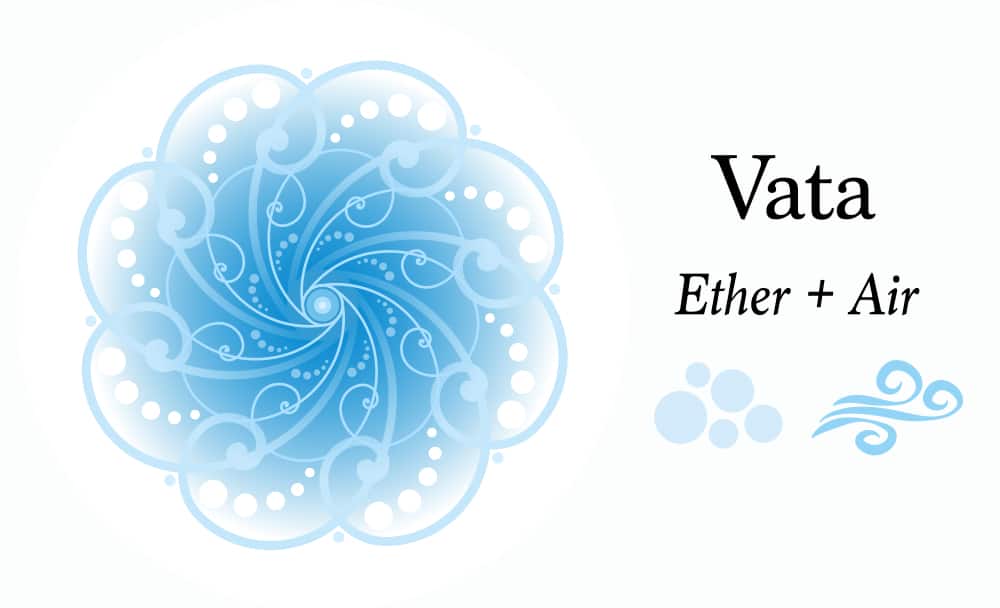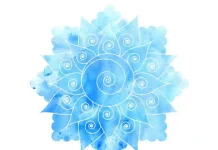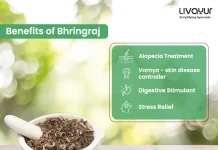Have you been feeling unsettled? Are you dealing with constipation, dry skin, and anxiety? If yes, then probably your Vata Dosha has been aggravated.
According to Ayurveda, your body is governed by three biological energies or Doshas, namely Vata, Pitta, and Kapha. They are responsible for all the physical and mental processes, and any imbalance in these Doshas can cause diseases and disorders in the body.
Vata aggravation usually makes you feel unsettled and leads to digestive problems. However, there are many more symptoms and consequences of Vata imbalance.
Let’s read more about it in this article and also find out ways to pacify Vata effectively.
According to Ayurveda, our body is governed by three biological energies or Doshas, namely Vata, Pitta, and Kapha. They are responsible for all the physical and mental processes, and any imbalance in these Doshas can cause diseases and disorders in the body.
Therefore, Ayurveda recommends always keeping these Doshas in balance. There are many dietary regulations, Yoga poses, and home remedies mentioned in Ayurveda that can help pacify each Dosha.
What is Vata Dosha
Vata Dosha is the Dosha that governs bodily movements, nervous system functions, and our physical and mental adaptability. People with Vata Dosha are generally highly mobile, have creative mind, and are full of vigor and vitality.
When Vata Dosha is in balance, energy flows into your body. However, when Vata is imbalanced, you may face diseases and disorders such as constipation, hypertension, weakness, arthritis, etc.
What are the causes of Vata Imbalance
Ayurveda defines each Dosha through some specific qualities or Gunas. The Gunas or properties of Vata are Ruksha (dry), Laghu (light), Sheeta (cold), Khara (rough), Sukshma (subtle), and Chala (mobile).
An increase in any of these qualities tends to imbalance Vata and lead to Vata-related disorders.
Therefore, it is advised to not continually expose your body and mind to cold food or dry and cold weather. Otherwise, your Vata Dosha might get aggravated.
Vata Dosha Symptoms
If you are experiencing any of the following Vata Dosha symptoms , there is a high chance that your Vata Dosha is imbalanced.
- Gastrointestinal disorders like constipation, gas, abdominal distension, etc.
- Rough and dry skin
- Body ache, weakness, fatigue and low vitality
- Interrupted sleep or insomnia
- Tremors and dizziness
- Difficulty tolerating cold
- Anxiety and panic
- Nervousness, agitation, impatience and fearfulness
- Feeling unsettled and ungrounded
- Excessive movement, thinking and speaking
Consequences of Vata Dosha Imbalance
An imbalance of the Vata Dosha can cause many health problems such as weakening of muscles, joint pains, headache, constipation, weight loss, cramps, convulsions, tremors, paralytic attacks, dryness of the skin, phobias, etc.
How to Pacify or Balance Vata Dosha
One of the best ways to restore the balance of Vata is through diet. The tips mentioned below will help you balance your Vata with food.
- Eat foods that are sweet, sour and salty in taste, and avoid foods that are bitter, astringent and pungent.
- Always eat whole, warm and freshly cooked food. Eating raw, uncooked and cold food can aggravate Vata.
- Add warm spices to your diet, such as ginger, black pepper, cinnamon, cloves, etc.
- Drink plenty of warm drinks.
- Include a generous amount of ghee in your meals. It will help nourish your tissues and balance the Ruksha property of Vata.
- Avoid eating dry and light foods such as popcorn, as this will aggravate the Ruksha and Laghu properties of Vata.
- Avoid eating heavy and deep-fried foods.
- Include 1-2 gms of jaggery in your diet. It is highly effective in balancing Vata.
- Include more papaya and pomegranate in your diet as they are highly beneficial in pacifying Vata Dosha and treating constipation.
Yoga That Can Help Balance Vata Dosha
There are many Yoga Asanas that can also help pacify Vata Dosha. A few of these Asanas are Vajrasana (Adamantine Pose), Marjariasana (Cat Pose), Surya Namaskar (Sun Salutation), Virabhadrasana (Warrior Pose), Vrikshasana (Tree Pose), Purna Pawanmuktasana (Wind Relieving Pose), Shavasana (Corpse Pose), Paschimottanasana (Seated Forward Bend Pose), Balasana (Child’s Pose), Dhanurasana (Bow Pose) and Ustrasana (Camel Pose).
While doing these Vata-pacifying Yoga Asanas, you should always maintain a slow and steady pace. You should also take a warm bath after Yoga to calm your senses if you have a Vata imbalance.
Other Lifestyle Tips to Balance Vata Dosha
- Maintain a consistent routine with a fixed schedule of bedtime, exercise time, and meal time.
- Keep yourself warm, peaceful, and relaxed. Indulge in hot baths, warm sesame oil massages, steam treatments, and relaxing music to pacify your Vata Dosha.
- Vata Dosha has Chala (mobile) quality. Therefore, meditate regularly for mental stability.
Takeaway
Vata Dosha is considered the most important Dosha in the body. All the other Doshas will become incapable without the presence of Vata or movement. It is also the Dosha that gets imbalanced easily. Therefore, you need to take extra caution with your food, exercise, and daily routine to ensure that your Vata Dosha always stays in balance.
FAQs on Vata Dosha
1. Which essential oils are best for Vata dosha?
Essential oils that give out a sweet fragrance can have Vata-balancing power. Sweet and warm oils such as jasmine, sandalwood, rose, lavender, and sweet orange oils can calm your imbalanced Vata.
2. Can spices balance your Vata?
Two commonly used spices, ginger and cardamom, can pacify your Vata. You may use these spices in your food or the tea you prepare.
3. When should you go to bed if you have Vata dosha?
Those with Vata dosha must sleep adequately. Resting is very necessary to balance your Vata. It is ideal to go to bed by 9.30 pm or latest, by 10 pm. Also, try getting cat naps whenever you can during the daytime.




















